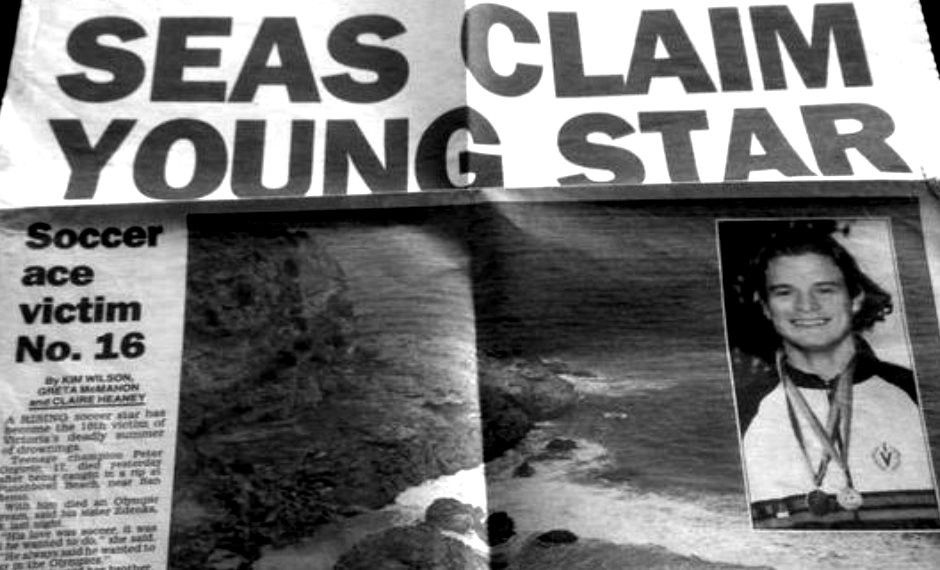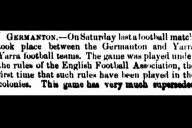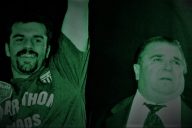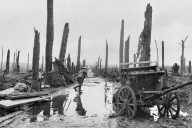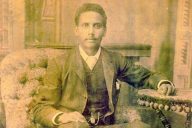In memory of Peter Grguric: The young star who was lost to football and claimed by the sea
“I’ll never forget the thing Peter used to do, where he’d kick the ball, juggle it with his head, shoulders, back, knees, just standing, going bang, bang, bang,” Zdenka says.
“You’d walk past, go to the toilet, he’d still be there going bang, bang, bang. You’d go to the other side of the house, look through the window, he was still doing it. He’d get it to 50, drop it, try again to get it to 60, 70. He just loved it that much.”
***
This story begins at Peter Grguric’s final resting place.
By complete chance, while visiting the burial site of a recently deceased family friend at Springvale Cemetery, I came across a grave adorned with a photo of a long-haired 17-year-old boy – born in 1980, died in 1998 – and inscriptions of a football and Croatian flag.
My curiosity was piqued, but quick Google searches of the name revealed very little. I did find out Peter was part of an impressive Springvale City team in the mid 1990s, alongside the Vargas and Grella brothers, and that the Australian National Schoolboys team Player of the Year medal is named after him – Massimo Luongo was a recipient in 2010. Later Twitter enquiries revealed that Peter was a talented youth touted to play in the NSL and beyond, who also had stints at Bulleen Lions and Melbourne Knights.
The biggest breakthrough, however, came while studying the names of his family members in newspaper clippings of his death and finding out via the phone directory they still lived in Somerville. A quick call later, we agreed to meet.
***
With everybody settled into their seats, I scan the scene surrounding me. Coffee and biscuits on the wooden table directly in front, Anton Grguric to my right, his wife Marica directly opposite me and daughter Zdenka to my left. Framed photos on the shelves ahead. A neatly kept garden outside. I’m in a warm, inviting, migrant household in outer south-east Melbourne.
Moments earlier, I had barely walked through the door when Anton started recalling the time his son moved from Springvale City to Melbourne Knights as a sprightly teenager and played against former teammate Rodrigo Vargas, who supposedly pleaded with his former compatriot to take it easy on him. I sensed immediately I was in the company of an avid football man, a proud father and a vivid storyteller.
The Grgurics arrived in Australia in 1969. Anton worked at BHP in Newcastle, before relocating to Victoria. Anton, Marica and their four children – Zdenka, Tony, Adam, Peter – all later outgrew their Springvale home and moved to a bigger property in Somerville, where Anton and Marica still live today. Peter was the youngest of the four children. It was evident from a very young age that football was his calling.
“When he was little, because we were much older and doing our own things, it was just dad who was with him in the back always mucking around with the soccer ball, so he got into it like that,” Zdenka recalls. “When it came to school and everything, soccer was the only thing he wrote about. He’d write stories about Melbourne Knights. It was always soccer, soccer, soccer. We still find his old soccer cards now.
“It was weird, he just loved it that much, despite none of us really pushing it onto him. He always had a ball at his feet, kicking the soft ball around the house and getting yelled at.”
When Peter was nine years old, the family took him to trial at local club Springvale City, where he quickly made an impression for his technical ability at such a young age.
“He said he wanted to play for a club so we took him to Springvale City,” Anton says.
“When he start first training, his coach asks, Are you Peter’s father?”
“Yes.”
“He play somewhere?”
“No.”
“You sure?”
“Sure. He plays with me, other kids, I teach him all that I know.”
Zdenka adds: “He just gelled really quickly, he blended in with kids, very happy-go-lucky, never thought he was the best, not a showoff, not a smart arse. He had charisma.”
Over the next few years Peter quickly developed a reputation as a standout player in a talented team whose members mostly stuck together for almost six years. Able to play in midfield or across the backline, he was tall for his age, but also quick and comfortable on the ball for his height. “He was a right footer, but I taught him how to play left, and he was better left footed than right. He could play centre-half, midfield, but mostly played as a left defender,” Anton says.
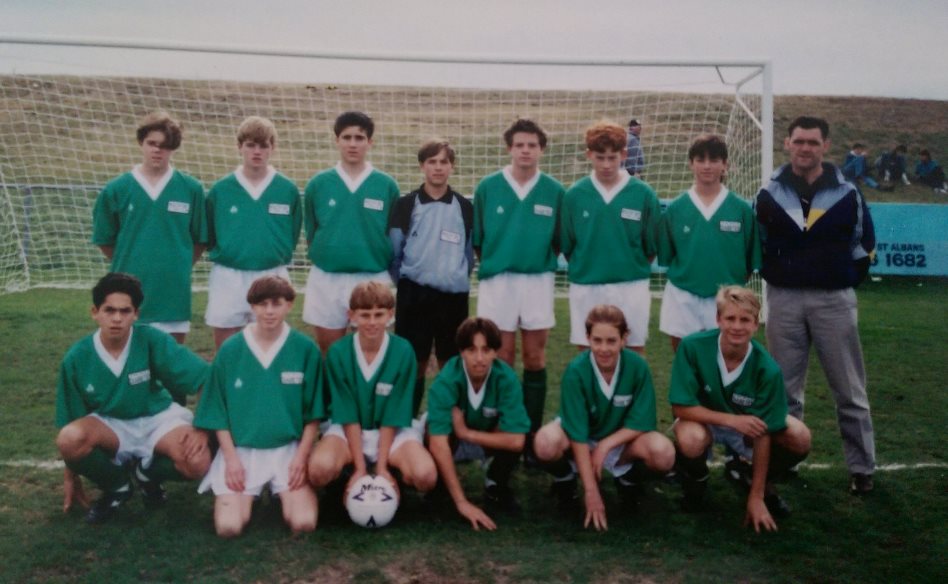
Peter Grguric standing fourth from the right (next to the goalkeeper) and Vince Grella on the bottom right representing the Southern All Stars regional team.
As family legend goes, Peter’s biggest breakthrough came at a time when he was barely able to feature on the pitch.
“For the Under 14 Victorian Cup he had glandular fever. We saw a doctor who sent a letter to the school and to the club saying no physical sport, no nothing for six months,” Anton says.
“Two months later, Melbourne Knights play Springvale City in Hampton Park in the semi-final. Tony picked up some beer and put it in my boot and said, ‘Dad, I will drive’.
“I said okay. I don’t know what’s going on. I see them move something else in the boot, fishing equipment, something, I don’t know. We went to the game, the four of us, then we go sit with our friends and start talking.
“One of the other fathers say, ‘Anton, Peter is here!’
“I know Peter is here, he came with us.”
“No, no, no. Look! He’s dressed! Peter will play!”
“Oh, Jesus Christ.”
“Tony is just standing there, laughing. Coach says, “Anton, sorry, I have to put him on, 10-15 minutes. He needs to have the ball.”
“I was upset, but I said, ‘What can I do? Leave it, he won’t play a full game anyway.’
“Coach tells the team, ‘When you have the ball, pass to him – one metre, two metre passes, just give him the ball and Peter will run.’
“Anyway, when he comes in the last 15 minutes it’s 0-0, then we score and win 1-0.”
“After when the game finished I said, ‘You know what the doctor said, he sent you a letter. I like to see you play but what about your health?’
“That finished, then in the final they played against Altona City. Same thing – I say to Peter, ‘I can’t stop you, it’s your life, I can’t stop you.’ Same thing. Fifteen minutes. He runs from left back. 1-0.”
“Some people after the game ask the referee, ‘Check this boy, how old he is, 16, 17?’
“But one of the Altona boys said, ‘No, he’s the same age as me. He’s good, that’s why you think he’s 17.’
***
Bigger opportunities started coming his way. The Joeys, National Schoolboys team, The Victorian and Australian Institutes of Sport, Melbourne Knights and Bulleen Lions all came calling within the next couple of years.
“Ernie Merrick from the Victorian Sports Institute called. We were also told that the Australian Institute of Sport was interested. But Peter said he wanted to play with Melbourne Knights,” Anton says.
“I said, ‘Peter, maybe you’re wrong?’
“He replies: ‘Dad, I’d like to play with Melbourne Knights.’”
Following stints with Bulleen – during the same time as Mark Bresciano – and the Knights in 1995/96, Peter returned to Springvale City. He made a Victorian Premier League debut in 1996 and scored three goals in Victoria’s State League One in 1997 – an impressive feat for a 17-year-old defender in a strong senior league at the time. That year he also toured with the Australian Schoolboys team in New Zealand and Brazil.
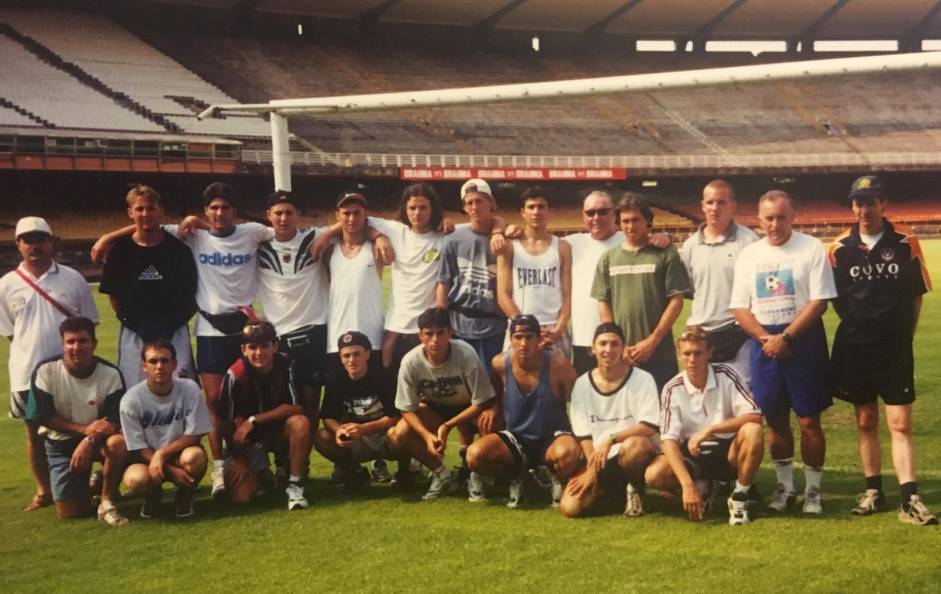
The Australian Schoolboys team visiting the Maracana in Rio De Janeiro, December 1997. Peter Grguric standing sixth from the left in the white t-shirt.
Approaching the 1998 season with the world at his feet, the 17-year-old joined a group of friends for a camping trip ahead of his final year of high school.
“It was just after the school holidays, first day back at work. My parents were at home, Tony had just left to go back to his work in Perth and Adam was at his work in the city,” Zdenka says.
“It was a stinking hot day, muggy, really weird, cloudy but humid, hot day. Dad was outside and the police came and knocked on the door.”
“The police came and said something happened,” Marica adds. “They told me, ‘Lady, can you sit down?’, but I said ‘I don’t need to sit down, just tell me what happened.’ I had this feeling.”
“He was with his friends, five or six of them, they were going to go camping up on the coast, a little bit of fishing, to have a break before school started, the last summer break. Peter normally didn’t do that, it was always soccer trips,” Zdenka resumes.
“It was fine, everything went fine, but it was around the time of all the drownings here, he was about the 16th person that drowned that summer. It was a really bad summer. It was just weird, I don’t know why, maybe it was fate.
“I remember just before he went on his trip, I was going out and getting ready in the bathroom and there was something on television about what to do if you get caught in a rip, we were talking about it, and he said, ‘Yeah, yeah I know’.
“He wasn’t a massively strong swimmer, but he was a good swimmer, and apparently where they went wasn’t actually a swimming spot, around where San Remo is. I’ve never been and I don’t want to go.
“It was such a hot humid day that the water was still, and of course the boys wanted to go for a swim. A few of them got caught in a rip but he never made it out.
“There were thousands of people at the funeral, we had people from the soccer federation call, we had newspapers call because it obviously was another drowning. There was a lot of support.
“I had no idea he knew so many people. We were forever getting cards from people we had no idea of, and people from families of other drowning victims.”
***
Football not only lost a talented up-and-coming junior that day, but also a passionate footballing family. The sport that once brought so much joy to the Grgurics is now a lifelong reminder of lost dreams. Gone forever was the daily routine of football and football training. Gone forever were the long car trips from Somerville to Springvale or Sunshine.
“Years. Years. I didn’t watch soccer on TV for maybe four, five years,” Anton admits.
“Those years I would work in my veggie garden, and hear steps, running steps. ‘Dad, we have to go to soccer, we have to go!’”
Today, Adam and Tony live overseas. Zdenka is the last remaining child in Australia with Anton and Marica.
“Since Peter died, Tony lives in Europe – he comes for a visit. Adam lives in Canada. Zdenka, when she got married, stayed here. Thank God that we have at least somebody,” Marica says.
“It’s very hard. Tony is most affected with Peter. Peter was closest to Tony, he was more into soccer than Adam.”
Only now is football starting to re-emerge in the family, with Zdenka’s sons Luka and Peter – the latter ironically a left-footer – playing at Langwarrin Soccer Club. Anton gets involved with the boys as much as he can at his age. Decades on, life is returning to normal, but the scars remain.
Peter was born around the same time as most of the current Socceroos’ golden generation – Bresciano, Cahill, Grella, Neill, Kewell. If he were still alive today, there’s every chance he could have featured among those names. Many people compared him to Springvale City compatriot Vince Grella at the same age. Instead, he departed from the world in the prime of his life.
While Marica shows me a photo of the three brothers standing under the Christmas tree at the family’s last Christmas together in 1997, I ask Anton what Peter could have achieved with his career.
“International. He always said he liked Boban, he wanted to play for Milan,” he says.
As the red light of the recorder finally dims on my phone, I bid farewell to the Grgurics. Driving home along the same route that would have taken the family to many football grounds, and now the cemetery, evokes a slight shiver down the spine.
The inscription on Peter’s grave reads, “Think of him still as the same and say he is not dead, he is just away,” from a poem by James Whitcomb Riley.
By those words, next year will mark 20 missed seasons and counting, but football will continue to patiently await Peter Grguric’s triumphant return.
Feature photo from the front page of Herald Sun, Tuesday, January 13, 1998.

